
Updated Bridging Audio Realms to the Screen Designing Eye-Catching Audio Graphs & Animating Video Sequences with Premiere Pro Mastery

Bridging Audio Realms to the Screen: Designing Eye-Catching Audio Graphs & Animating Video Sequences with Premiere Pro Mastery
By using waveform of the sound waves in Premiere Pro, we can better edit audio. In the following article, we’ll learn how the audio waveform auto-sync feature in Premiere Pro helps automatically align and merge clips in the Project panel, in the timeline, and when setting up a multicamera project and how to insert audio waveform on your clips using Premiere Pro.
Part 1. How to show Audio Waveform on clips in Premiere Pro? (2 ways)
Users frequently complain that the audio waveform can suddenly disappear while editing audio in Premiere Pro, which is quite annoying to deal with. In the following tutorial, I’m going to show you how to make the audio waveforms visible.
1. Click the wrench icon on settings button
If you are not seeing them on audio clips on your timeline, then you drag on an audio clip to your timeline or your sequence and just click on the wrench and check to show audio waveform.
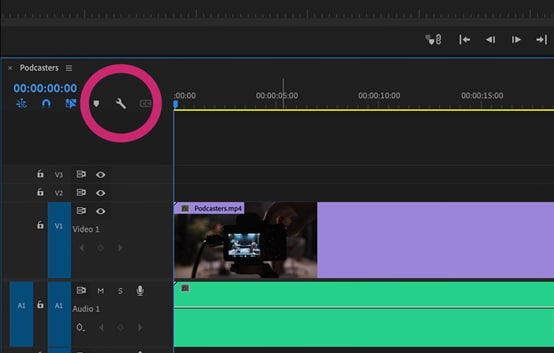
Once you check that you should see the audio waveforms on your clip you can click it again you should see a checkmark and it is highlighted in blue and if you don’t want to see them all you have to do is click it again.
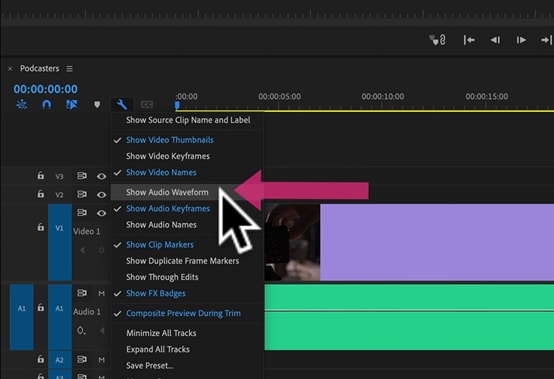
That will toggle off the audio waveforms and that is how to show the audio waveforms on your audio clips in adobe premiere pro.
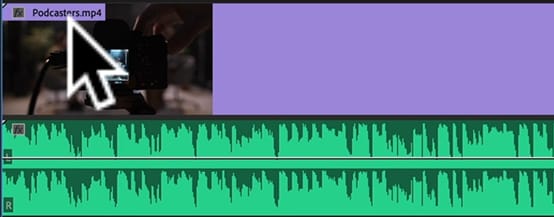
2. Automatic generate audio waveform
Make sure “Automatic audio waveform creation” is selected by going to “Edit > Preferences > Audio” first. When importing files, no waveforms are generated if option is unticked. Only clips you import moving forward will be impacted by this; clips already imported won’t be affected.
Second, for creating audio waveforms on clips that don’t have them, select the clips in the Program panel and go to “Clip > Generate Audio Waveform”.
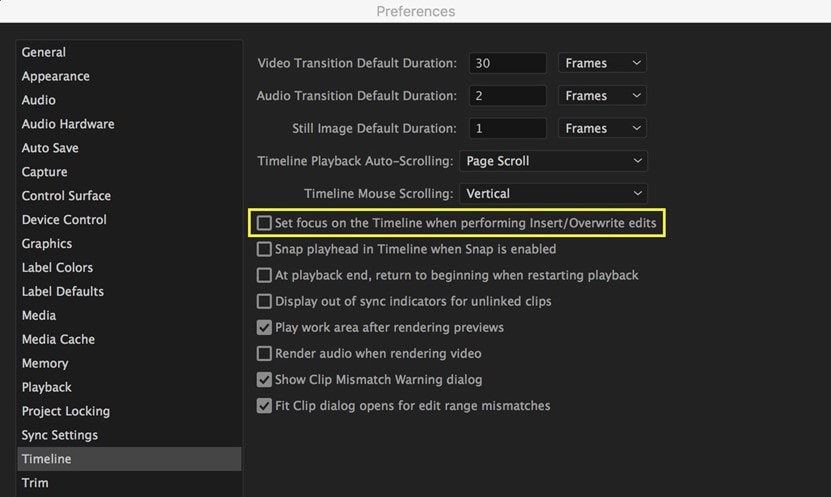
Part 2. How to add audio waveform animation in Premiere Pro?
If you want to simply add a dynamic effect to your audio, just follow the tutorial below.
Step1Click After Effects Composition
First, make sure both the video and audio are selected. Right-click and select replace with After Effects composition.
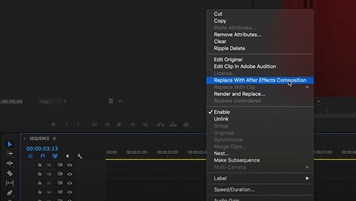
Step2Create a new solid in After Effects
After creating a new project in After Effects, you need to choose a new solid of any color in your composition.
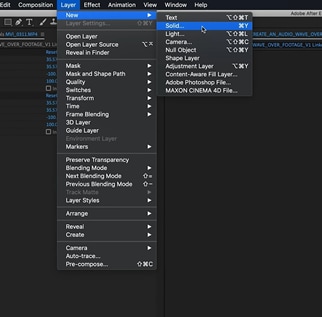
Step3Open audio waveform effect
Search audio waveform and drag and drop this effect on your solid. The waveform will now respond to the audio in your film if you use the audio layer option for your clip in the effect parameters for your solid change.
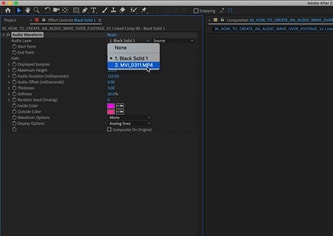
Step4Adjust the audio waveform effect
The position of the waveform on your video can be changed by utilizing the start and end point settings. Make sure the last values for each selections are the same to maintain an even level. Next, you can change the characteristics to give your waveform the desired appearance. Here, I applied some fundamental settings that are effective for singing. Using the two-color picker options and the display options, you may also change the waveform’s inner and outer colors.
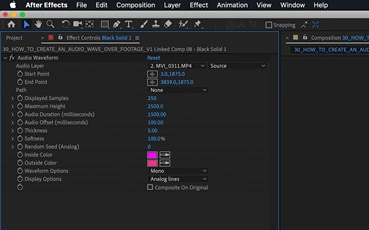
Step5Check the animation and export the video
Back in Premiere, you can pick whether you want the traditional analog lines to appear or a more contemporary digital waveform. Your clip will now be replaced with an After Effects composition that is dynamically tied to the audio waveform.
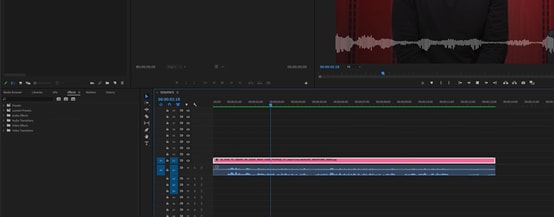
Part 3. How to change the incorrect audio waveform in Premiere Pro?
These problems typically result from corrupted cache/peak files. If you have cleared the cache from the application. I will recommend cleaning them manually by going to the location specified in “Preferences > Media Cache”.
Clean the contents of the folder named Media Cache, Media Cache files, and Peak files (Before cleaning them, please ensure to open these folders once and verify if they have any of the media files in them to avoid any accidental deletion of required media or asset).
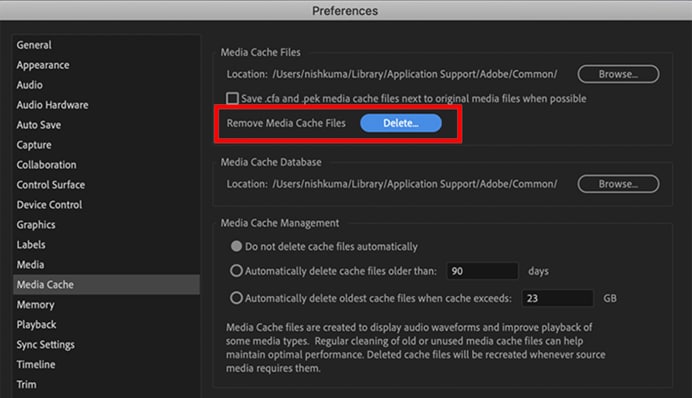
Please make sure that the option “Save.cfa and.pek cache files next to the original media files when possible” is unchecked. If it is ticked, you will have to remove them by hand from the folders where the media files are kept.
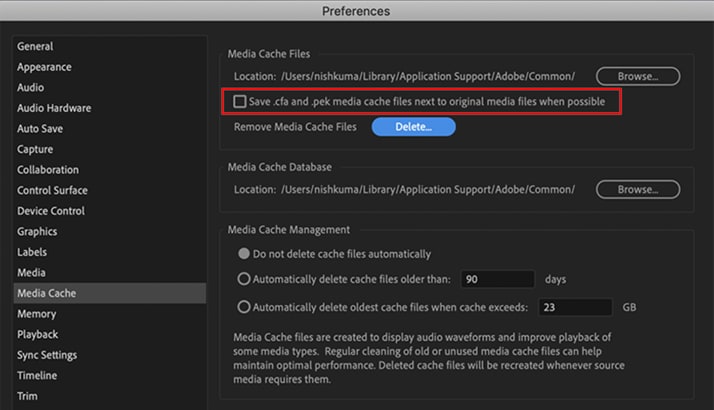
The Audio previews can also be cleaned (File > Project Settings > Scratch Disks > Audio Previews).
The following time you open the project, these files will be cleared. Rebuilding the necessary cache and peak files could take some time.
Part 4. How to add audio waveform animation to video with Premiere Pro alternative?
In reality, based on the above process, it is clear that you must use After Effects to add audio waveform animation effects in Premiere Pro. Although you can further modify the animation, this approach is very difficult for beginners to understand, and it has a high learning cost. In this situation, we strongly advise you to try Filmora Audio Visualizer . We provide more than 25 animation effects and fixed pre-made waveform elements, and you can also adjust the color and frequency in Advanced Settings. Come and give it a try!
Conclusion
This article will help you in resolving various audio waveform issues in Premiere Pro. Additionally, you can discover how to create waveforms in your audio clips. You should try Wondershare Filmora to add the waveform animation even if Premiere Pro is one of the greatest audio and video editing programs. Beginners will find it more convenient and simpler. If you simply want to quickly polish your music video or podcast video, the Filmora audio visualizer is a better option.
Free Download For Win 7 or later(64-bit)
Free Download For macOS 10.14 or later
Conclusion
This article will help you in resolving various audio waveform issues in Premiere Pro. Additionally, you can discover how to create waveforms in your audio clips. You should try Wondershare Filmora to add the waveform animation even if Premiere Pro is one of the greatest audio and video editing programs. Beginners will find it more convenient and simpler. If you simply want to quickly polish your music video or podcast video, the Filmora audio visualizer is a better option.
Free Download For Win 7 or later(64-bit)
Free Download For macOS 10.14 or later
The Complete Tutorial on Using Autotune with Audacity Users
You might be surprised to learn that audacity’s many default audio effects do not include an autotune feature if you have ever had to correct a song’s pitch or tuning. Not to worry!. GSnap is a free plugin that lets you use autotune (not to be confused with Auto-Tune) in audacity. On Windows, Mac OS X, and Linux computers, you can autotune and adjust the pitch of recorded files using GSnap.
This article will guide you to download the audacity autotune plugin to your computer and install it. Then you will be able to adjust the pitch of your sounds easily and tune them automatically without any hassle. This is a free download that can be installed in audacity to help you fine-tune your live vocal performance. During vocal pitch correction, it allows audacity to expand its functionality.
How Does Auto-tune Works?
Negative feedback from listeners is a common occurrence for singers. They need to satisfy their audience by giving them their most perfect production numbers. Nevertheless, there are instances when they need the aid of a device to conceal their mistakes or avoid making them. So they lip-sync and autotune their prerecorded songs.
Singers and music producers are not the only ones to use autotune. The most common users are ordinary people who have made music creation a part of their lives. Then how does autotuning operate?
The pitch is raised to the nearest correct tone when a person sings with the key off (out-of-tune). Moreover, the distortion can mask the out-of-tune parts (especially the highest and lowest pitches) in the overall performance.
How To Add Autotune To Audacity Using GSnap?
The autotune effect in audacity is enabled by the GSnap plugin (from GVST). This might be useful for correcting your pitch or creating a robotic voice. You can download it for free and install it on your computer.
You need to follow the steps to get a free autotune for audacity. Be sure to follow every step to avoid any issues.
Step 1
Find GVST - GSnap by searching Google. You can find information about GVST on the official website.
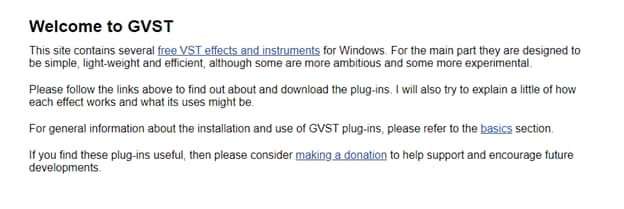
Step 2
The downloads section can be found at the top of the page. When you click it, you will be taken to the Downloads page.
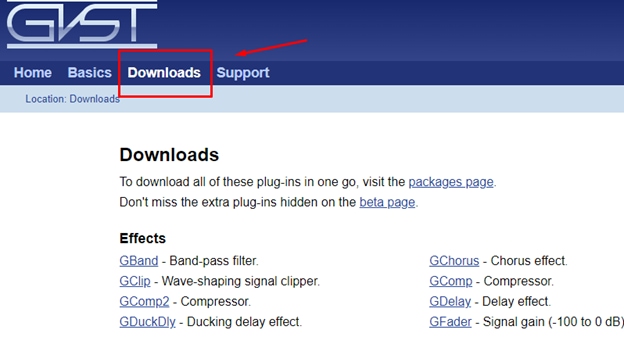
Step 3
Find GSnap from the list of downloads and click on it. A new page will open to find a GSnap download link. Once you click on it, a zip file will be downloaded to your pc. Keep in mind that this download will only work for windows. For mac and Linux, there will be a separate download link.
Step 4
Open the downloaded zip file and extract all files in it.
Step 5
There will be two files present in the folder once you have extracted them. Copy the .dll file to the Audacity plugin directory. Find the Audacity folder in the Program Files folder on your computer. Paste your copied file into the plugins subfolder. Your plugins will be added.
If you are using macOS, then open the Applications folder, right-click audacity’s icon, and choose “Show Package Contents.” Next, open the folders “Contents” and “Extensions.”
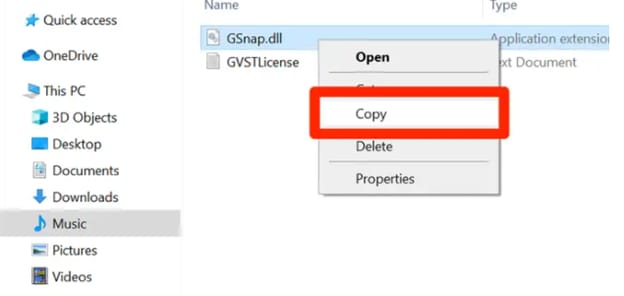
Step 6
In some cases, you may be asked for the administrator’s permission. All you need to do is click on the “Continue Anyway” button if a dialogue box appears and wait for any undergoing process to complete.
Step 7
Now run the audacity program, and if it is already running, you may need to restart it to recognize the autotune audacity plugin.
Step 8
Try recording a new sound in audacity, or you can also open an existing one from your system.
Step 9
Choose the Add / Remove plugins option from the Effects menu in the menu bar. You can enable GSnap by scrolling down and clicking on Enable. Click OK to continue.
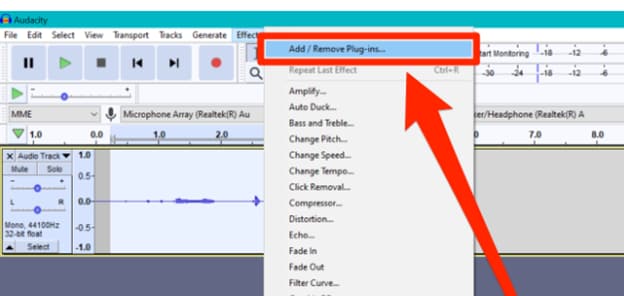
Step 10
GSnap will appear as an effective option under the “Effect” tab in audacity with the new update. Clicking on it will open a window that allows you to tune your audio file automatically.
GSnap has several options and knobs that can be used individually to autotune audio files. Get more information on GSnap’s online manual or by experimenting with the options.
Final Verdict
There is no doubt that autotune feature is a necessity of sound producers these days. Although it isn’t present in audacity, which is the most widely used tool for audio editing but using GSnap, you can get auto tune for audacity now. It is free to download, and in this article, we showed you how you could easily add it to audacity in just a few simple steps.
For Win 7 or later (64-bit)
For macOS 10.12 or later
Step 2
The downloads section can be found at the top of the page. When you click it, you will be taken to the Downloads page.

Step 3
Find GSnap from the list of downloads and click on it. A new page will open to find a GSnap download link. Once you click on it, a zip file will be downloaded to your pc. Keep in mind that this download will only work for windows. For mac and Linux, there will be a separate download link.
Step 4
Open the downloaded zip file and extract all files in it.
Step 5
There will be two files present in the folder once you have extracted them. Copy the .dll file to the Audacity plugin directory. Find the Audacity folder in the Program Files folder on your computer. Paste your copied file into the plugins subfolder. Your plugins will be added.
If you are using macOS, then open the Applications folder, right-click audacity’s icon, and choose “Show Package Contents.” Next, open the folders “Contents” and “Extensions.”

Step 6
In some cases, you may be asked for the administrator’s permission. All you need to do is click on the “Continue Anyway” button if a dialogue box appears and wait for any undergoing process to complete.
Step 7
Now run the audacity program, and if it is already running, you may need to restart it to recognize the autotune audacity plugin.
Step 8
Try recording a new sound in audacity, or you can also open an existing one from your system.
Step 9
Choose the Add / Remove plugins option from the Effects menu in the menu bar. You can enable GSnap by scrolling down and clicking on Enable. Click OK to continue.

Step 10
GSnap will appear as an effective option under the “Effect” tab in audacity with the new update. Clicking on it will open a window that allows you to tune your audio file automatically.
GSnap has several options and knobs that can be used individually to autotune audio files. Get more information on GSnap’s online manual or by experimenting with the options.
Final Verdict
There is no doubt that autotune feature is a necessity of sound producers these days. Although it isn’t present in audacity, which is the most widely used tool for audio editing but using GSnap, you can get auto tune for audacity now. It is free to download, and in this article, we showed you how you could easily add it to audacity in just a few simple steps.
For Win 7 or later (64-bit)
For macOS 10.12 or later
Step 2
The downloads section can be found at the top of the page. When you click it, you will be taken to the Downloads page.

Step 3
Find GSnap from the list of downloads and click on it. A new page will open to find a GSnap download link. Once you click on it, a zip file will be downloaded to your pc. Keep in mind that this download will only work for windows. For mac and Linux, there will be a separate download link.
Step 4
Open the downloaded zip file and extract all files in it.
Step 5
There will be two files present in the folder once you have extracted them. Copy the .dll file to the Audacity plugin directory. Find the Audacity folder in the Program Files folder on your computer. Paste your copied file into the plugins subfolder. Your plugins will be added.
If you are using macOS, then open the Applications folder, right-click audacity’s icon, and choose “Show Package Contents.” Next, open the folders “Contents” and “Extensions.”

Step 6
In some cases, you may be asked for the administrator’s permission. All you need to do is click on the “Continue Anyway” button if a dialogue box appears and wait for any undergoing process to complete.
Step 7
Now run the audacity program, and if it is already running, you may need to restart it to recognize the autotune audacity plugin.
Step 8
Try recording a new sound in audacity, or you can also open an existing one from your system.
Step 9
Choose the Add / Remove plugins option from the Effects menu in the menu bar. You can enable GSnap by scrolling down and clicking on Enable. Click OK to continue.

Step 10
GSnap will appear as an effective option under the “Effect” tab in audacity with the new update. Clicking on it will open a window that allows you to tune your audio file automatically.
GSnap has several options and knobs that can be used individually to autotune audio files. Get more information on GSnap’s online manual or by experimenting with the options.
Final Verdict
There is no doubt that autotune feature is a necessity of sound producers these days. Although it isn’t present in audacity, which is the most widely used tool for audio editing but using GSnap, you can get auto tune for audacity now. It is free to download, and in this article, we showed you how you could easily add it to audacity in just a few simple steps.
For Win 7 or later (64-bit)
For macOS 10.12 or later
Step 2
The downloads section can be found at the top of the page. When you click it, you will be taken to the Downloads page.

Step 3
Find GSnap from the list of downloads and click on it. A new page will open to find a GSnap download link. Once you click on it, a zip file will be downloaded to your pc. Keep in mind that this download will only work for windows. For mac and Linux, there will be a separate download link.
Step 4
Open the downloaded zip file and extract all files in it.
Step 5
There will be two files present in the folder once you have extracted them. Copy the .dll file to the Audacity plugin directory. Find the Audacity folder in the Program Files folder on your computer. Paste your copied file into the plugins subfolder. Your plugins will be added.
If you are using macOS, then open the Applications folder, right-click audacity’s icon, and choose “Show Package Contents.” Next, open the folders “Contents” and “Extensions.”

Step 6
In some cases, you may be asked for the administrator’s permission. All you need to do is click on the “Continue Anyway” button if a dialogue box appears and wait for any undergoing process to complete.
Step 7
Now run the audacity program, and if it is already running, you may need to restart it to recognize the autotune audacity plugin.
Step 8
Try recording a new sound in audacity, or you can also open an existing one from your system.
Step 9
Choose the Add / Remove plugins option from the Effects menu in the menu bar. You can enable GSnap by scrolling down and clicking on Enable. Click OK to continue.

Step 10
GSnap will appear as an effective option under the “Effect” tab in audacity with the new update. Clicking on it will open a window that allows you to tune your audio file automatically.
GSnap has several options and knobs that can be used individually to autotune audio files. Get more information on GSnap’s online manual or by experimenting with the options.
Final Verdict
There is no doubt that autotune feature is a necessity of sound producers these days. Although it isn’t present in audacity, which is the most widely used tool for audio editing but using GSnap, you can get auto tune for audacity now. It is free to download, and in this article, we showed you how you could easily add it to audacity in just a few simple steps.
For Win 7 or later (64-bit)
For macOS 10.12 or later
Cyber Audio Puzzle Master - Slicing, Merging MP3 Files
Online Audio & Mp3 Cutter, Audio Trimmer is a simple online tool which lets you trim your audio files on the fly. Choose your file and click Upload to get started! Uploaded files are stored in a temporary folder and automatically removed from the server within two hours.
It always makes me exciting that we can cut MP3 files and merge several parts into one file using those mp3 cutter and joiner software. For example, nowadays most people use MP3 cutter software to cut the best part of a song as their ringtones or cut the best part of many different songs and merge them into one song. And here’s a list of best free 8 mp3 cutter and joiner software recommend for you. These let you cut pieces of audio from audio files easily. These free software offer various features, like cutting MP3 audio files, fade in and fade out, choosing start point and end point, create ringtones for mobile phones from audio files, create various sound clips for presentations, making of audio books, making of jokes etc
Filmora Audio Recorder
Record computer system audio
Capture microphone audio
Customize recording volume
Record screen and webcam as well
1. AudioTrimmer
Totally free and easy to use! With our simple interface, editing audio is very easy. Just upload your track, select the part you want to cut out, and click crop. Your trimmed sound track will be ready within seconds. AudioTrimmer is designed to work on most modern devices including tablets and mobile phones.
Steps on Using AudioTrimmer
- Click and navigate to AudioTrimmer’s online audio removal tool to get started.
- Choose an audio file from your device.
- On the next screen, click the **Modebutton and put the tool into “Remove” mode.
- Click and drag the slider handles to select the unwanted part of the audio that you want to delete.
- Click **Cropto cut the selected part out of your song. This will delete that unwanted part of the audio and seamlessly combine the remaining parts into one.
- Now you can download your new shortened song.
2. AUDIO JOINER
Free of charge online application aimed at joining a few audio tracks into one. This service supports multiple formats and allows you to apply cross-fade mixing to an unlimited amount of tracks. Audio joiner works in the browser and doesn’t require installment of any applications. You just need to upload file, apply required effects and tap “Join” button - so you get the result.
Steps on Using Audio Joiner
Once you arrive at Audio Joiner, you will be told to add music tracks of your choice, from files you have downloaded on your computer. As an example, I will be using the songs that I used to make the mashup that is playing during this presentation.
Start by clicking on “Add Tracks”
Click on the blue sliders on the bottom of the track and drag it left or right (or use your left/right arrow keys) to edit how long you want the song to play. You can also choose which part of the track to play specifically as well.
Your screen will open up to your files and ask you to select your songs. Choose as many music files (mp3 is best) as you want to add. For this example, I will be using 3 songs.
Just wait for it to join the files and.
Your finished! Just download your new mash-up and you’re done! You are then able to resume editing your song, or start over with a new one.
3. AUDIO JOINER
Audio Joiner is designed to merge several songs (mp3, m4a, wav, etc) into a single track. The program is absolutely free and operates online; therefore you don’t need to install it on your computer. Just open the browser and start merging. Merge multiple audio files into a single track.
Steps to Follow While Using an Audio Joiner
- Open Online Audio Joiner website.
- Add audio tracks.
- Set the order of playback.
- Adjust the intervals.
- Select the mode of joining.
- Next, click the “Join” button.
- After the tracks have been joined, click “Download” link to save the composition on your hard drive.
4.ONLINE AUDIO JOINER
The Online Audio Combiner lets you convert your music file to a desired format and use crossfade between your merged songs. What does joining audio mean?
When you join audio files, you’re combining them so multiple files will exist as a single audio file. There are both online audio joining sites and offline audio merging software programs you can use. You can delete those sections you don’t desire and then merge the other clips together to make a continuous file.
How to Merge Audio Files Online
STEP 1
Select an audio file
To put your songs together, you can add two or more files from your PC, Mac, Android or iPhone. It’s also possible to upload them from your Dropbox or Google Drive account. Each file can be up to 500 MB for free.
STEP 2
Combine MP3 and other audio
If you want, you can add more tracks to merge. Then drag and drop them until you’re satisfied with the order. It’s possible to convert and crossfade the music file if it’s necessary. Take a look at the how-to guide to understand better how to combine audio files.
STEP 3
Save the result
And it’s done! Now you can listen to the joined audio to make sure you like it. If it’s so, download it to your device or back to cloud storage. Otherwise, just go back to editing.
CONCLUSION
Merging audios is combining several audio files into one. We usually select the songs whose styles are similar with each other. Then, we can adjust the playback speed and combine them into a new one. Besides, we can mix two songs. For example, we can mix the narrator’s words into a song. By this way, listeners can understand the meaning while enjoying the songs.
1. AudioTrimmer
Totally free and easy to use! With our simple interface, editing audio is very easy. Just upload your track, select the part you want to cut out, and click crop. Your trimmed sound track will be ready within seconds. AudioTrimmer is designed to work on most modern devices including tablets and mobile phones.
Steps on Using AudioTrimmer
- Click and navigate to AudioTrimmer’s online audio removal tool to get started.
- Choose an audio file from your device.
- On the next screen, click the **Modebutton and put the tool into “Remove” mode.
- Click and drag the slider handles to select the unwanted part of the audio that you want to delete.
- Click **Cropto cut the selected part out of your song. This will delete that unwanted part of the audio and seamlessly combine the remaining parts into one.
- Now you can download your new shortened song.
2. AUDIO JOINER
Free of charge online application aimed at joining a few audio tracks into one. This service supports multiple formats and allows you to apply cross-fade mixing to an unlimited amount of tracks. Audio joiner works in the browser and doesn’t require installment of any applications. You just need to upload file, apply required effects and tap “Join” button - so you get the result.
Steps on Using Audio Joiner
Once you arrive at Audio Joiner, you will be told to add music tracks of your choice, from files you have downloaded on your computer. As an example, I will be using the songs that I used to make the mashup that is playing during this presentation.
Start by clicking on “Add Tracks”
Click on the blue sliders on the bottom of the track and drag it left or right (or use your left/right arrow keys) to edit how long you want the song to play. You can also choose which part of the track to play specifically as well.
Your screen will open up to your files and ask you to select your songs. Choose as many music files (mp3 is best) as you want to add. For this example, I will be using 3 songs.
Just wait for it to join the files and.
Your finished! Just download your new mash-up and you’re done! You are then able to resume editing your song, or start over with a new one.
3. AUDIO JOINER
Audio Joiner is designed to merge several songs (mp3, m4a, wav, etc) into a single track. The program is absolutely free and operates online; therefore you don’t need to install it on your computer. Just open the browser and start merging. Merge multiple audio files into a single track.
Steps to Follow While Using an Audio Joiner
- Open Online Audio Joiner website.
- Add audio tracks.
- Set the order of playback.
- Adjust the intervals.
- Select the mode of joining.
- Next, click the “Join” button.
- After the tracks have been joined, click “Download” link to save the composition on your hard drive.
4.ONLINE AUDIO JOINER
The Online Audio Combiner lets you convert your music file to a desired format and use crossfade between your merged songs. What does joining audio mean?
When you join audio files, you’re combining them so multiple files will exist as a single audio file. There are both online audio joining sites and offline audio merging software programs you can use. You can delete those sections you don’t desire and then merge the other clips together to make a continuous file.
How to Merge Audio Files Online
STEP 1
Select an audio file
To put your songs together, you can add two or more files from your PC, Mac, Android or iPhone. It’s also possible to upload them from your Dropbox or Google Drive account. Each file can be up to 500 MB for free.
STEP 2
Combine MP3 and other audio
If you want, you can add more tracks to merge. Then drag and drop them until you’re satisfied with the order. It’s possible to convert and crossfade the music file if it’s necessary. Take a look at the how-to guide to understand better how to combine audio files.
STEP 3
Save the result
And it’s done! Now you can listen to the joined audio to make sure you like it. If it’s so, download it to your device or back to cloud storage. Otherwise, just go back to editing.
CONCLUSION
Merging audios is combining several audio files into one. We usually select the songs whose styles are similar with each other. Then, we can adjust the playback speed and combine them into a new one. Besides, we can mix two songs. For example, we can mix the narrator’s words into a song. By this way, listeners can understand the meaning while enjoying the songs.
1. AudioTrimmer
Totally free and easy to use! With our simple interface, editing audio is very easy. Just upload your track, select the part you want to cut out, and click crop. Your trimmed sound track will be ready within seconds. AudioTrimmer is designed to work on most modern devices including tablets and mobile phones.
Steps on Using AudioTrimmer
- Click and navigate to AudioTrimmer’s online audio removal tool to get started.
- Choose an audio file from your device.
- On the next screen, click the **Modebutton and put the tool into “Remove” mode.
- Click and drag the slider handles to select the unwanted part of the audio that you want to delete.
- Click **Cropto cut the selected part out of your song. This will delete that unwanted part of the audio and seamlessly combine the remaining parts into one.
- Now you can download your new shortened song.
2. AUDIO JOINER
Free of charge online application aimed at joining a few audio tracks into one. This service supports multiple formats and allows you to apply cross-fade mixing to an unlimited amount of tracks. Audio joiner works in the browser and doesn’t require installment of any applications. You just need to upload file, apply required effects and tap “Join” button - so you get the result.
Steps on Using Audio Joiner
Once you arrive at Audio Joiner, you will be told to add music tracks of your choice, from files you have downloaded on your computer. As an example, I will be using the songs that I used to make the mashup that is playing during this presentation.
Start by clicking on “Add Tracks”
Click on the blue sliders on the bottom of the track and drag it left or right (or use your left/right arrow keys) to edit how long you want the song to play. You can also choose which part of the track to play specifically as well.
Your screen will open up to your files and ask you to select your songs. Choose as many music files (mp3 is best) as you want to add. For this example, I will be using 3 songs.
Just wait for it to join the files and.
Your finished! Just download your new mash-up and you’re done! You are then able to resume editing your song, or start over with a new one.
3. AUDIO JOINER
Audio Joiner is designed to merge several songs (mp3, m4a, wav, etc) into a single track. The program is absolutely free and operates online; therefore you don’t need to install it on your computer. Just open the browser and start merging. Merge multiple audio files into a single track.
Steps to Follow While Using an Audio Joiner
- Open Online Audio Joiner website.
- Add audio tracks.
- Set the order of playback.
- Adjust the intervals.
- Select the mode of joining.
- Next, click the “Join” button.
- After the tracks have been joined, click “Download” link to save the composition on your hard drive.
4.ONLINE AUDIO JOINER
The Online Audio Combiner lets you convert your music file to a desired format and use crossfade between your merged songs. What does joining audio mean?
When you join audio files, you’re combining them so multiple files will exist as a single audio file. There are both online audio joining sites and offline audio merging software programs you can use. You can delete those sections you don’t desire and then merge the other clips together to make a continuous file.
How to Merge Audio Files Online
STEP 1
Select an audio file
To put your songs together, you can add two or more files from your PC, Mac, Android or iPhone. It’s also possible to upload them from your Dropbox or Google Drive account. Each file can be up to 500 MB for free.
STEP 2
Combine MP3 and other audio
If you want, you can add more tracks to merge. Then drag and drop them until you’re satisfied with the order. It’s possible to convert and crossfade the music file if it’s necessary. Take a look at the how-to guide to understand better how to combine audio files.
STEP 3
Save the result
And it’s done! Now you can listen to the joined audio to make sure you like it. If it’s so, download it to your device or back to cloud storage. Otherwise, just go back to editing.
CONCLUSION
Merging audios is combining several audio files into one. We usually select the songs whose styles are similar with each other. Then, we can adjust the playback speed and combine them into a new one. Besides, we can mix two songs. For example, we can mix the narrator’s words into a song. By this way, listeners can understand the meaning while enjoying the songs.
1. AudioTrimmer
Totally free and easy to use! With our simple interface, editing audio is very easy. Just upload your track, select the part you want to cut out, and click crop. Your trimmed sound track will be ready within seconds. AudioTrimmer is designed to work on most modern devices including tablets and mobile phones.
Steps on Using AudioTrimmer
- Click and navigate to AudioTrimmer’s online audio removal tool to get started.
- Choose an audio file from your device.
- On the next screen, click the **Modebutton and put the tool into “Remove” mode.
- Click and drag the slider handles to select the unwanted part of the audio that you want to delete.
- Click **Cropto cut the selected part out of your song. This will delete that unwanted part of the audio and seamlessly combine the remaining parts into one.
- Now you can download your new shortened song.
2. AUDIO JOINER
Free of charge online application aimed at joining a few audio tracks into one. This service supports multiple formats and allows you to apply cross-fade mixing to an unlimited amount of tracks. Audio joiner works in the browser and doesn’t require installment of any applications. You just need to upload file, apply required effects and tap “Join” button - so you get the result.
Steps on Using Audio Joiner
Once you arrive at Audio Joiner, you will be told to add music tracks of your choice, from files you have downloaded on your computer. As an example, I will be using the songs that I used to make the mashup that is playing during this presentation.
Start by clicking on “Add Tracks”
Click on the blue sliders on the bottom of the track and drag it left or right (or use your left/right arrow keys) to edit how long you want the song to play. You can also choose which part of the track to play specifically as well.
Your screen will open up to your files and ask you to select your songs. Choose as many music files (mp3 is best) as you want to add. For this example, I will be using 3 songs.
Just wait for it to join the files and.
Your finished! Just download your new mash-up and you’re done! You are then able to resume editing your song, or start over with a new one.
3. AUDIO JOINER
Audio Joiner is designed to merge several songs (mp3, m4a, wav, etc) into a single track. The program is absolutely free and operates online; therefore you don’t need to install it on your computer. Just open the browser and start merging. Merge multiple audio files into a single track.
Steps to Follow While Using an Audio Joiner
- Open Online Audio Joiner website.
- Add audio tracks.
- Set the order of playback.
- Adjust the intervals.
- Select the mode of joining.
- Next, click the “Join” button.
- After the tracks have been joined, click “Download” link to save the composition on your hard drive.
4.ONLINE AUDIO JOINER
The Online Audio Combiner lets you convert your music file to a desired format and use crossfade between your merged songs. What does joining audio mean?
When you join audio files, you’re combining them so multiple files will exist as a single audio file. There are both online audio joining sites and offline audio merging software programs you can use. You can delete those sections you don’t desire and then merge the other clips together to make a continuous file.
How to Merge Audio Files Online
STEP 1
Select an audio file
To put your songs together, you can add two or more files from your PC, Mac, Android or iPhone. It’s also possible to upload them from your Dropbox or Google Drive account. Each file can be up to 500 MB for free.
STEP 2
Combine MP3 and other audio
If you want, you can add more tracks to merge. Then drag and drop them until you’re satisfied with the order. It’s possible to convert and crossfade the music file if it’s necessary. Take a look at the how-to guide to understand better how to combine audio files.
STEP 3
Save the result
And it’s done! Now you can listen to the joined audio to make sure you like it. If it’s so, download it to your device or back to cloud storage. Otherwise, just go back to editing.
CONCLUSION
Merging audios is combining several audio files into one. We usually select the songs whose styles are similar with each other. Then, we can adjust the playback speed and combine them into a new one. Besides, we can mix two songs. For example, we can mix the narrator’s words into a song. By this way, listeners can understand the meaning while enjoying the songs.
Also read:
- [New] 2024 Approved How to Use ScreenRec
- [Updated] 2024 Approved CartoonCanvas Comprehensive Review & Guidebook '24
- [Updated] Behind-the-Scenes Fixes for Instagram Videos
- [Updated] Efficient YouTube Video Logging Solutions for 2024
- [Updated] The Complete Guide to Downloading, Setting up and Using OBS on macOS for 2024
- In 2024, 4 Most-Known Ways to Find Someone on Tinder For Realme C33 2023 by Name | Dr.fone
- In 2024, How to Stop Google Chrome from Tracking Your Location On Xiaomi Redmi Note 13 Pro+ 5G? | Dr.fone
- New 2024 Approved IMovie Basics for New Users How to Seamlessly Add Sounds and Music
- New 2024 Approved Podcast Editing 101 How to Edit a Podcast
- New 2024 Approved The Best in Show A Comprehensive Review of the 10 Most Effective Podcast to Text Apps
- New 2024 Approved The Ultimate Guide to M4A Files on Android Tips & Tricks for Todays Users
- New Comprehensive Guide to Nero WaveAudio Editor
- New Exploring the Best Voice Mimicry Applications of the Year
- Simplified Steps to Reset Wacom Drivers Across WIN Operating Systems
- Upgrade Your Network with Netgear Nighthawk X6S - Ultimate Wi-Fi Range Extension
- Title: Updated Bridging Audio Realms to the Screen Designing Eye-Catching Audio Graphs & Animating Video Sequences with Premiere Pro Mastery
- Author: Paul
- Created at : 2024-10-22 23:36:02
- Updated at : 2024-10-24 02:04:58
- Link: https://voice-adjusting.techidaily.com/updated-bridging-audio-realms-to-the-screen-designing-eye-catching-audio-graphs-and-animating-video-sequences-with-premiere-pro-mastery/
- License: This work is licensed under CC BY-NC-SA 4.0.